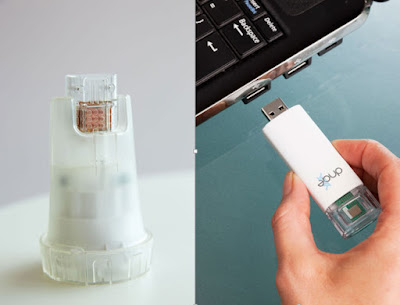- Advertisement -
A team of engineers and scientists from Imperial College London and DNA Electronics has developed a disposable USB device to detect HIV with a single drop of blood.
The tiny test kit uses a mobile phone chip to determine whether the HIV virus is present in a small blood sample. When the virus is picked up, it triggers a change in acidity that the chip converts into an electrical signal. The USB stick stores the signal and gives an accurate test result when plugged into a computer program.
Not only has the device proved highly accurate, correctly identifying 95% of over 900 samples, it does it incredibly quickly. Current tests take at least 3 or more days, with samples sent to specialist laboratories. The average test time for the USB device came in at just over 20 minutes.
A rapid and disposable test could be used by people with HIV to monitor their own treatment, and could enable patients in remote areas to access treatments more effectively. Many developing countries lack the necessary testing facilities and treatments altogether. This is particularly serious in areas where the rate of infection is high. A quick response when testing vulnerable patients or babies could mark the difference between life and death.
Viral load
As well as the fast detection of the virus, the new USB technology monitors the viral load in blood samples. This is the amount of the virus that is present in the blood stream and is crucial to monitoring a patient’s treatment.
Current HIV treatments reduce the virus level in the blood to almost zero. If the medication stops working, or the patient stops taking it, virus levels will start to rise. Although still in its infancy, the USB device could allow patients to regularly monitor their own virus levels, just as people with diabetes monitor their blood sugar.
Dr Graham Cooke, senior author of the research from the Department of Medicine at Imperial said: “Monitoring viral load is crucial to the success of HIV treatment. At the moment, testing often require costly and complex equipment that can take a couple of days to produce a result. We have taken the job done by this equipment, which is the size of a large photocopier, and shrunk it down to a USB chip.”
DNA Electronics, an Imperial spinout company, have been working with Imperial to develop the technology. A similar device has been used previously to detect bacterial and fungal sepsis and antibiotic resistance. They are currently investigating whether the device can be used to test for other viruses, such as hepatitis.
Professor Chris Toumazou, biomedical engineer and DNAe’s Founder, said: “This is a great example of how this new analysis technology has the potential to transform how patients with HIV are treated by providing a fast, accurate and portable solution. At DNAe we are already applying this highly adaptable technology to address significant global threats to health, where treatment is time-critical and needs to be right first time.”
First published Qprize
- Advertisement -
